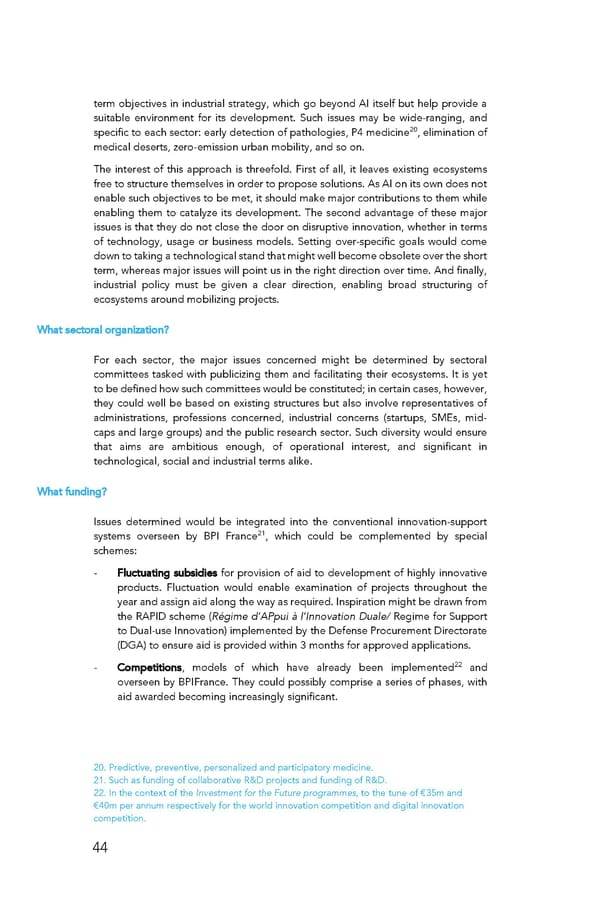term objectives in industrial strategy, which go beyond AI itself but help provide a suitable environment for its development. Such issues may be wide-ranging, and specific to each sector: early detection of pathologies, P4 medicine20, elimination of medical deserts, zero-emission urban mobility, and so on. The interest of this approach is threefold. First of all, it leaves existing ecosystems free to structure themselves in order to propose solutions. As AI on its own does not enable such objectives to be met, it should make major contributions to them while enabling them to catalyze its development. The second advantage of these major issues is that they do not close the door on disruptive innovation, whether in terms of technology, usage or business models. Setting over-specific goals would come down to taking a technological stand that might well become obsolete over the short term, whereas major issues will point us in the right direction over time. And finally, industrial policy must be given a clear direction, enabling broad structuring of ecosystems around mobilizing projects. What sectoral organization? For each sector, the major issues concerned might be determined by sectoral committees tasked with publicizing them and facilitating their ecosystems. It is yet to be defined how such committees would be constituted; in certain cases, however, they could well be based on existing structures but also involve representatives of administrations, professions concerned, industrial concerns (startups, SMEs, mid- caps and large groups) and the public research sector. Such diversity would ensure that aims are ambitious enough, of operational interest, and significant in technological, social and industrial terms alike. What funding? Issues determined would be integrated into the conventional innovation-support systems overseen by BPI France21, which could be complemented by special schemes: - Fluctuating subsidies for provision of aid to development of highly innovative products. Fluctuation would enable examination of projects throughout the year and assign aid along the way as required. Inspiration might be drawn from the RAPID scheme (Régime d’APpui à l’Innovation Duale/ Regime for Support to Dual-use Innovation) implemented by the Defense Procurement Directorate (DGA) to ensure aid is provided within 3 months for approved applications. - Competitions, models of which have already been implemented22 and overseen by BPIFrance. They could possibly comprise a series of phases, with aid awarded becoming increasingly significant. 20. Predictive, preventive, personalized and participatory medicine. 21. Such as funding of collaborative R&D projects and funding of R&D. 22. In the context of the Investment for the Future programmes, to the tune of €35m and €40m per annum respectively for the world innovation competition and digital innovation competition. 44
 For a Meaningful AI - Report Page 44 Page 46
For a Meaningful AI - Report Page 44 Page 46